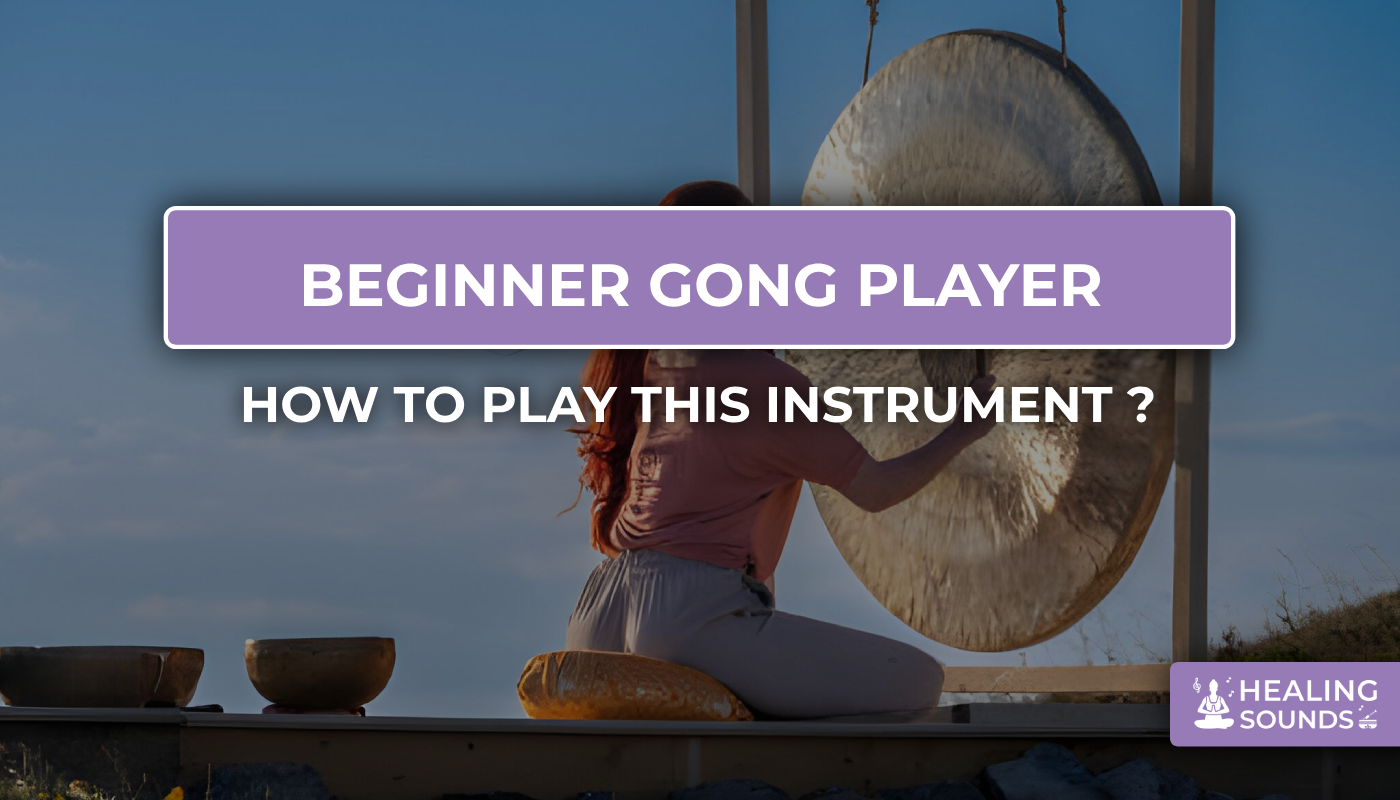Welcome to the enchanting world of the gong instrument, an ancient tool revered for its deep resonance and power in meditation, sound healing, and musical expression. If you're captivated by the powerful vibrations of the gong and eager to learn gong playing, you've found the perfect starting point. This guide is designed specifically for gong for beginners, walking you through the essentials to begin your journey with this magnificent instrument.
Whether you're a meditation enthusiast seeking deeper relaxation, a sound healing practitioner exploring new modalities, or simply curious about this unique instrument, we'll cover the basics you need to get started confidently.

What is a Gong Instrument?
A gong instrument is typically a large, circular metal disc, usually bronze or brass, that produces sound when struck. Its origins trace back thousands of years, primarily in East and Southeast Asia. While related percussion instruments exist in various cultures, including Japan, the types of gongs most commonly used today in sound therapy and orchestras, like the Chau gong, have strong roots in Chinese gongs traditions.
Gongs come in various sizes, shapes, and types (tuned or untuned), each creating distinct sound profiles and overtone complexities. Understanding these variations is the first step toward appreciating the instrument's versatility.
Choosing Your First Gong: Best Gongs for Beginners
Selecting your first gong instrument can feel daunting, but focusing on a few key aspects makes it easier. For beginners, manageability and versatility are often prioritized. Consider the gong's size (larger gongs generally have deeper tones but require more space and a sturdier stand), the sound character (bright, deep, sustained), and your budget.
Many beginners start with a medium-sized Chau gong (around 22-30 inches) as they offer a good balance of rich tones and are relatively easy to play. Hand gongs are also excellent, affordable, and portable options for personal meditation practice.

30cm Hand Gong Instrument for Sound Healing
$89.90
This compact hand gong is perfect for beginners, offering easy handling and beautiful tones for personal meditation or small sound healing sessions.
Explore Hand GongEssential Gong Playing Equipment
To begin your gong playing journey, you only need a few essential items:
- The Gong: Chosen based on your needs and space.
- A Mallet (or Mallets): A quality mallet designed for gongs is crucial. Different mallet heads (hard, soft, fluffy) produce different sounds. Start with a general-purpose mallet suited to your gong size.
- A Gong Stand or Hanger: Essential for larger gongs to allow them to vibrate freely and safely. Hand gongs can often be held or placed on a cushion.

How to Play the Gong: Basic Techniques for Beginners
Learning how to play a gong is less about complex musical scores and more about connecting with the instrument and its vibrations. Here are the fundamental steps for gong playing:
Do You Need to Warm Up a Gong?
Yes, it's generally recommended to "wake up" or warm up the gong before playing more forcefully. This involves tapping the gong very gently with your mallet several times around the surface.
This isn't about temperature but about initiating subtle vibrations in the metal, preparing it to resonate more fully and preventing potential stress fractures from sudden, hard strikes on a "cold" or dormant gong.
Holding the Mallet and Striking
Hold the mallet comfortably but firmly, allowing your wrist some flexibility. How and how to properly hit a gong significantly impacts the sound.
- Center Strikes: Striking near the center usually produces the fundamental tone, often deep and grounding.
- Off-Center Strikes: Striking further from the center brings out more complex overtones and higher frequencies.
- Gentle Taps vs. Firm Strikes: Experiment with the force of your strike. Start gently to explore the initial sounds before building volume.
Exploring Dynamics
Gong playing involves controlling the volume and intensity (dynamics). Practice starting with very soft taps and gradually increasing the force and frequency of your strikes to create a swelling sound (crescendo). Similarly, practice letting the sound decay naturally or by gently dampening it with your hand or mallet.
Watch this video for a visual demonstration of basic gong playing techniques:
Setting Up Your Practice Space
Create a calm, quiet environment where you can focus on the sounds without distraction. Ensure your gong stand is stable and positioned so you can comfortably reach all parts of the gong's surface.
Consider the acoustics of your room – soft furnishings can absorb some sound, while hard surfaces can make it more echoey. Experiment to find what feels best for your practice.
Your First Gong Playing Session
For your initial sessions, keep it simple. Focus on creating a relaxing sonic atmosphere rather than a complex performance. A common structure involves:
- Beginning: Start with gentle taps to warm up the gong and create a calm opening.
- Building: Gradually explore different striking points and dynamics, allowing the sound to build in intensity if desired. Listen intently to the layers of sound.
- Peak/Sustain: Allow the gong's resonance to fill the space. You might hold a sustained tone or create waves of sound.
- Fade Out: Slowly decrease the intensity, returning to gentle taps or allowing the sound to decay naturally into silence.
Remember, the intention behind your playing, especially for meditation or sound healing, is key. Focus on creating a space of peace and resonance. The effects of vibrational sound therapy are being increasingly studied for their potential benefits on relaxation and well-being (related research).

Explore Gongs for Deeper Resonance
Authentic Chau gong embodying traditional craftsmanship, ideal for exploring classic Chinese gongs sounds. Learn more ➔

40cm Nepalese Gong Instrument for Sound Healing
$359.90
$469.90
Handcrafted Nepalese gong with rich, warm tones perfect for focused sound healing and meditation practices. Learn more ➔
Practice Tips for Improvement
Mastering the gong instrument is a continuous journey of exploration. Here are some tips:
- Be Consistent: Even short, regular practice sessions are more effective than infrequent long ones.
- Listen Deeply: Pay close attention to the nuances of sound - the fundamental tone, the overtones, the decay.
- Record Yourself: Hearing recordings of your playing can offer valuable insights.
- Explore Resources: Read articles, watch videos, or consider a workshop with experienced players. Learn about the cultural context, such as the role of gongs in Gamelan ensembles (learn more).
- Experiment: Don't be afraid to try different mallets, striking techniques, and dynamics.
Conclusion
Embarking on your journey with the gong instrument is an invitation to explore sound, resonance, and stillness in a profound way. By understanding the basics of the instrument, choosing the right equipment for a gong for beginners, practicing fundamental gong playing techniques, and cultivating mindful listening, you can unlock the incredible potential of this ancient tool.
Whether your goal is relaxation, meditation, sound healing, or musical exploration, the gong offers a rich and rewarding path. Be patient with yourself, enjoy the process of learning, and allow the transformative power of the gong's vibrations to resonate within you. Explore our collection at Healing Sounds to find the perfect gong instrument to begin your practice.
Frequently Asked Questions about Playing the Gong
Start by choosing a suitable beginner gong (like a Hand Gong or medium Chau Gong) and a mallet. Gently "wake up" the gong with soft taps. Hold the mallet comfortably and experiment striking different areas (center for fundamental tone, edges for overtones) with varying force. Focus on listening and creating a smooth flow of sound.
Hold the mallet loosely but securely. Strike the gong surface perpendicularly (straight on). Avoid glancing blows. The force determines volume, and the location determines tone/overtones. Always warm up the gong first with gentle taps before applying significant force to prevent damage and allow for richer resonance.
Gongs have ancient origins across East and Southeast Asia. While Japan has related percussion instruments, the large, resonant gongs commonly used in sound healing and orchestras today (like Chau and Wind gongs) are most strongly associated with Chinese gongs traditions. Different types evolved in various regions like Indonesia, Thailand, and Burma as well.
Yes, it's highly recommended. Gently tapping the gong surface multiple times before playing more intensely helps initiate vibration in the metal. This "wakes up" the gong, allowing it to respond more fully and reducing the risk of damage from sudden, hard impacts on dormant metal.
A medium-sized Chau gong (22-30 inches) is often recommended as one of the best gongs for beginners due to its versatility and rich sound. Alternatively, a smaller Hand Gong (around 30cm/12 inches) is an excellent, affordable, and portable starting point, especially for personal meditation.



